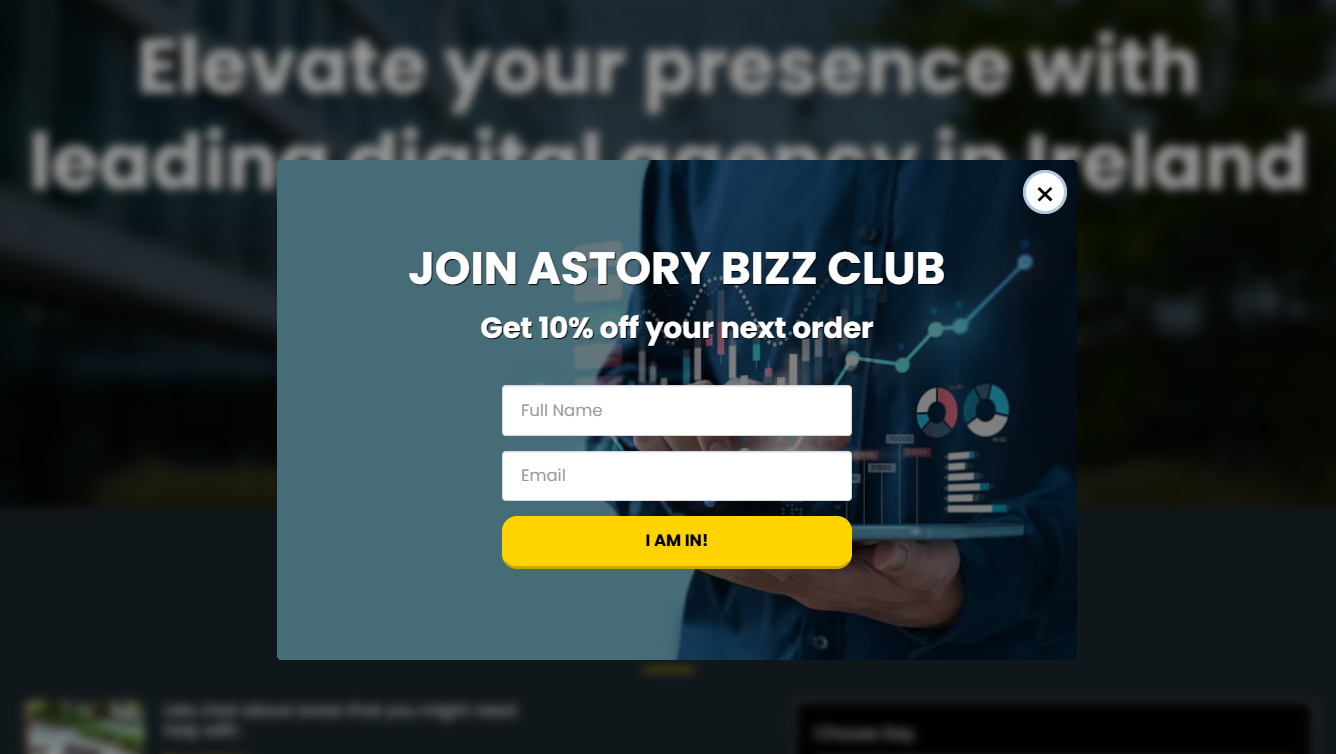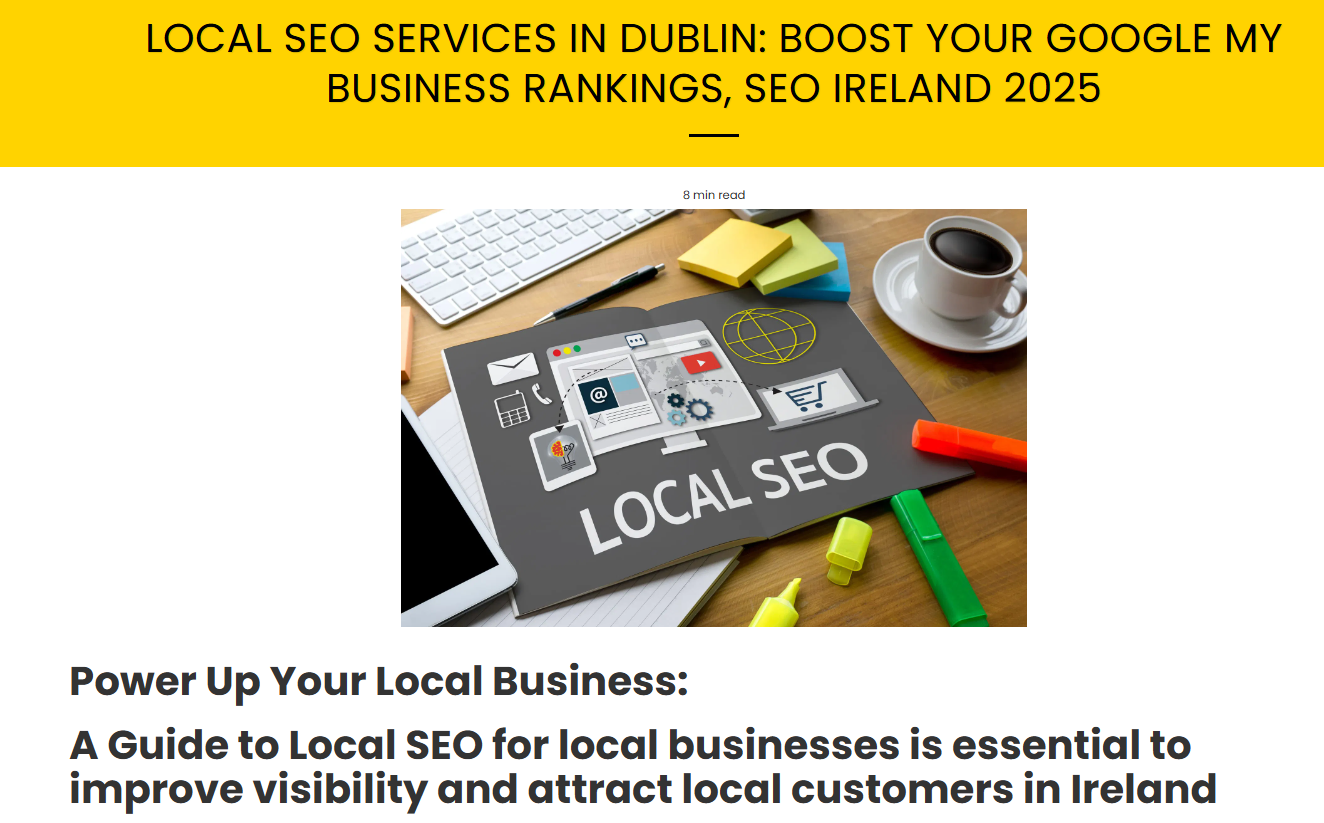Content Page
Top Strategies for Startup Success: The Ultimate Digital Marketing Guide
Are you a startup looking to make a big impact in the digital world? Look no further! In this ultimate digital marketing guide, we'll share the top strategies that can lead your startup to success. From building a strong online presence to developing effective marketing campaigns, we've got you covered.
Embarking on a new entrepreneurial journey can be daunting, but with the right digital marketing strategies in place, your startup will be well-positioned for growth and success.
In this comprehensive guide, we'll walk you through the crucial steps to take to ensure your startup thrives in the competitive digital landscape.
With our expert advice and practical tips, you'll learn how to optimize your website for search engines, effectively use social media platforms to engage with your target audience, create compelling content that drives traffic and conversions, and much more.
We'll equip you with the tools and knowledge needed to outrank your competitors and attract customers in a highly competitive market.
So, whether you're just starting out or looking to refine your existing digital marketing efforts, this guide is your roadmap to startup success. Get ready to take your business to new heights with the power of digital marketing!
Importance of Digital Marketing for Startups
In today’s fast-paced digital environment, the significance of digital marketing for startups cannot be overstated.
With a multitude of platforms and tools available, startups can effectively reach their target audiences at a fraction of the cost of traditional marketing methods.
Digital marketing provides an unparalleled opportunity to create brand awareness and establish a presence in a competitive landscape where every impression counts. It enables startups to leverage online channels to engage customers, build relationships, and ultimately convert prospects into loyal clients.
Furthermore, digital marketing is highly measurable, allowing startups to track their performance in real-time. This capability is crucial for new businesses aiming to optimize their marketing strategies and allocate resources effectively.
By analyzing metrics such as website traffic, conversion rates, and customer engagement levels, startups can gain valuable insights into what works and what doesn’t.
This adaptability is vital for growth, as it allows businesses to pivot their strategies based on data-driven decisions, ensuring that they remain competitive and relevant.
Thousands of people are using Woorise to track their growth, give it a try and see for yourself.

Moreover, digital marketing levels the playing field for startups. Unlike established companies with larger budgets, startups can utilize cost-effective strategies such as social media marketing and content creation to compete for attention.
These avenues allow smaller businesses to communicate their unique value propositions and connect with their audiences in authentic ways.
By harnessing the power of digital marketing, startups can gain traction, attract investment, and lay the groundwork for long-term success in their respective industries.
Defining Your Target Audience and Creating Buyer Personas
Understanding your target audience is a fundamental step in any effective digital marketing strategy.
By identifying who your ideal customers are, startups can tailor their marketing efforts to resonate with specific demographics, interests, and behaviors.
This targeted approach increases the likelihood of conversions, as marketing messages can be customized to address the unique needs and pain points of potential customers.
Startups should conduct thorough research to define their audience, considering factors such as age, gender, location, and purchasing habits.
Creating buyer personas is an essential part of this process.
A buyer persona is a semi-fictional representation of your ideal customer based on market research and real data about your existing customers.
You can use a free tools like this one from hubspot https://www.hubspot.com/make-my-persona

Startups can develop these personas by gathering information through surveys, interviews, and social media insights. Each persona should reflect not only demographic information but also psychographic details, including motivations, challenges, and goals.
By constructing detailed buyer personas, startups can gain a deeper understanding of their customers and create targeted marketing campaigns that speak directly to their audience.
Once buyer personas are established, they can guide every aspect of your digital marketing strategy. From content creation to social media engagement, knowing your audience enables you to craft messages that resonate and foster connections.
This alignment between your brand and your customers can significantly enhance engagement, brand loyalty, and ultimately, conversions.
By regularly revisiting and refining your personas as your business grows and market dynamics shift, you can ensure that your marketing efforts remain relevant and effective.
Another free persona tool offered by Semrush https://www.semrush.com/persona/

Conducting Market Research and Competitor Analysis
Market research is a vital component of any successful startup strategy.
By understanding the landscape in which you operate, you can make informed decisions that drive growth and mitigate risks.
Startups should begin by analyzing industry trends, customer preferences, and market demands to identify opportunities and challenges.
Utilizing a combination of qualitative and quantitative research methods, such as surveys, focus groups, and online analytics, can provide valuable insights into your target market's behaviors and preferences.
In addition to understanding your audience, conducting competitor analysis is equally important. By examining what your competitors are doing well—and where they are falling short—you can identify gaps in the market that your startup can exploit.
Analyzing competitors’ marketing strategies, product offerings, pricing, and customer feedback can reveal opportunities for differentiation. This competitive intelligence allows you to position your startup strategically, ensuring that you stand out in a crowded marketplace.
Furthermore, market research and competitor analysis should be ongoing processes.
As market conditions evolve and consumer behaviors shift, staying informed will help your startup adapt and thrive.
Regularly revisiting your research will allow you to refine your strategies, respond to emerging trends, and maintain a competitive edge.
By grounding your decisions in thorough research and analysis, you can navigate challenges more effectively and capitalize on new opportunities for growth.
Youcan use Powerful Forms & Landing Pages for Lead Generation from Woorise. They offer convenient lifetime deal or subscription deal.

Developing a Strong Brand Identity and Messaging
A strong brand identity is crucial for startups looking to make a lasting impression in the digital landscape.
Your brand identity encompasses everything from your logo and color palette to your tone of voice and messaging. It reflects your values, mission, and what you stand for as a business.
Establishing a consistent and compelling brand identity can help your startup differentiate itself from competitors and foster a sense of trust and loyalty among customers.
To create an effective brand identity, startups should begin by defining their core values and mission statement. This foundational work will inform every aspect of your branding, ensuring alignment between your identity and your audience’s expectations.
Additionally, conducting visual branding exercises can help you design a logo and select colors that resonate with your target demographic.
The visual elements of your brand should evoke the desired emotions and convey the essence of your business.
Messaging is another critical component of brand identity.
Your messaging should communicate who you are, what you offer, and why customers should choose you over competitors. Startups should develop a clear value proposition that highlights the unique benefits of their products or services.
Consistency in messaging across all digital channels—such as your website, social media, and email communications—will reinforce your brand identity and help build recognition and trust with your audience.
For example:
Our website says: Elevate your presence with leading digital agency in Ireland which clearly says who we are, what we will do for our customers and what country we operate in.
You must be clear and concise. Say what you do and how the other people can benefit from your service or product.

Anyone clicking at our link will https://www.astory.pro/ get immediate offer to join our emailing list. That helps us to get new leads and proposals.

The subscriber benefits from getting fresh info about our offerings and updates while we were able to secure another paying customer. More about email list and how to connect all the dots in another article.
Website Optimization and Search Engine Optimization (SEO)
Your website is often the first point of contact between your startup and potential customers, making website optimization a crucial aspect of your digital marketing strategy.
A well-optimized website not only enhances user experience but also improves your chances of ranking higher in search engine results.
Startups should focus on several key elements, including site speed, mobile-friendliness, and intuitive navigation, to create an efficient online experience that keeps visitors engaged.
Search Engine Optimization (SEO) is integral to driving organic traffic to your website.
Effective SEO strategies involve both on-page and off-page optimization techniques. On-page SEO includes optimizing your content with relevant keywords, improving meta tags, and ensuring that your images have appropriate alt text.
These practices help search engines understand your content and rank it accordingly.
Off-page SEO, on the other hand, involves building quality backlinks and establishing your website's authority through guest blogging, social media engagement, and partnerships.

Regularly monitoring your website's performance using analytics tools will provide insights into how well your SEO strategies are working. Key metrics such as organic traffic, bounce rate, and average session duration can help you identify areas for improvement.
By continually refining your website's optimization and SEO efforts, you can enhance your online visibility and attract more potential customers, ultimately leading to higher conversion rates and business growth.
If you need help with any type of SEO, check our blog post Power Up Your Local Business:A Guide to Local SEO for local businesses is essential to improve visibility and attract local customers in Ireland
Content Marketing and Storytelling
Content marketing is a powerful strategy for startups looking to establish authority and engage their target audiences. By creating valuable, informative, and entertaining content, startups can position themselves as thought leaders in their respective industries. This approach not only helps in building trust with potential customers but also encourages them to take action, whether it’s signing up for a newsletter, following your brand on social media, or making a purchase. A key aspect of content marketing is storytelling. People connect with stories on an emotional level, which can make your brand more relatable and memorable. Sharing your startup's journey, challenges, and successes can create a narrative that resonates with your audience. Additionally, customer testimonials and case studies can serve as powerful storytelling tools, showcasing real-life examples of how your products or services have made a difference in people's lives. Startups should diversify their content formats to reach a broader audience. This may include blog posts, videos, infographics, podcasts, and social media posts. Each format serves a unique purpose and can cater to different preferences among your audience. By consistently delivering high-quality content that aligns with your brand voice and engages your audience, you can foster a loyal community that advocates for your startup and contributes to its growth.
Social Media Marketing and Influencer Partnerships
Social media marketing is an indispensable tool for startups aiming to engage with customers and build brand awareness. Platforms such as Facebook, Instagram, Twitter, and LinkedIn offer unique opportunities to connect with your target audience in a more personal and interactive manner. Startups should develop a comprehensive social media strategy that outlines their goals, target audience, content types, and posting frequency. Consistency and authenticity are key; engaging with followers through comments, messages, and user-generated content can strengthen relationships and foster brand loyalty. Collaborating with influencers can significantly amplify your brand’s reach and credibility. Influencers have established trust with their followers, making their endorsements powerful marketing tools. Startups should identify influencers whose values align with their brand and who have an audience that mirrors their target demographic. Partnering with the right influencers can help startups tap into new markets, drive traffic, and increase conversions through authentic recommendations and insights. Moreover, leveraging social media analytics can provide valuable insights into the effectiveness of your campaigns. Monitoring metrics such as engagement rates, reach, and conversions will help you understand what content resonates with your audience and enable you to optimize your strategy accordingly. By combining organic social media efforts with influencer partnerships, startups can create a robust online presence that drives brand awareness and customer engagement.
Email Marketing and Lead Generation
Email marketing remains one of the most effective channels for startups to nurture leads and drive conversions. Unlike social media platforms where algorithms can limit visibility, email allows you to reach your audience directly in their inboxes. Building an email list should be a priority for startups, as it enables you to communicate with interested prospects and existing customers on a more personalized level. Offering valuable incentives, such as exclusive content or discounts, can encourage users to subscribe to your mailing list. Once you have built your email list, segmenting it based on user behavior and preferences can enhance the effectiveness of your campaigns. Tailored messaging that addresses specific needs and interests will result in higher open and click-through rates. Startups can utilize various types of emails, including newsletters, promotional offers, and automated drip campaigns, to engage their audience and guide them through the sales funnel. This targeted approach ensures that your communication is relevant and valuable, increasing the likelihood of conversion. Measuring the success of your email marketing efforts is essential for continual improvement. Analyzing metrics such as open rates, click-through rates, and conversion rates will provide insights into what strategies are effective and where adjustments are needed. By continually refining your email marketing campaigns and focusing on providing value to your subscribers, startups can foster long-lasting relationships with their audience and drive sustainable growth.
Measuring and Analyzing Your Digital Marketing Efforts
To ensure the ongoing success of your digital marketing strategies, measuring and analyzing your efforts is crucial. This process involves collecting data on various metrics related to your campaigns, such as website traffic, conversion rates, and engagement levels. By utilizing analytics tools like Google Analytics, startups can gain valuable insights into how users interact with their website and marketing materials. This data-driven approach allows businesses to identify which strategies are working and which may need adjustments. It’s essential to set clear objectives and key performance indicators (KPIs) for your digital marketing campaigns. This will provide a framework for evaluating your efforts and determining success. Common KPIs include website traffic, lead generation, customer acquisition cost, and return on investment (ROI). By regularly tracking these metrics, startups can make informed decisions about where to invest their resources and how to optimize their marketing strategies for better results. Moreover, conducting A/B testing on various elements of your marketing campaigns, such as email subject lines, ad copy, and landing pages, can reveal what resonates best with your audience. This iterative process allows startups to continuously refine their strategies and maximize their impact. By fostering a culture of experimentation and analysis, startups can stay agile and responsive in a rapidly changing digital landscape, ensuring ongoing growth and success.
Conclusion and Next Steps for Startup Success
In conclusion, navigating the digital marketing landscape is essential for startup success. By implementing the strategies discussed in this guide—ranging from defining your target audience to measuring your marketing efforts—your startup can build a strong online presence and effectively engage with potential customers. As you embark on this journey, remember that consistency, adaptability, and a customer-centric approach are key to thriving in a competitive market. As you move forward, consider developing a comprehensive digital marketing plan that outlines your goals, target audience, and strategies. This roadmap will serve as a guide to keep your efforts focused and aligned with your overall business objectives. Additionally, don’t hesitate to seek out resources, such as online courses, webinars, or consulting services, to deepen your understanding of specific digital marketing tactics. Ultimately, the digital marketing landscape is ever-evolving, and staying informed about emerging trends and technologies will be crucial for your startup's growth. Join relevant industry communities, participate in discussions, and continuously educate yourself to keep your marketing strategies fresh and effective. By taking these next steps, you’ll be well-equipped to drive your startup toward lasting success in the digital world.
